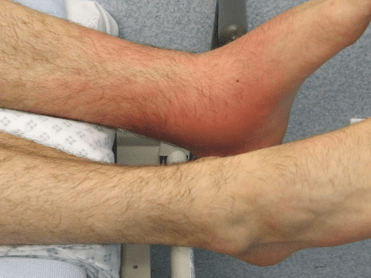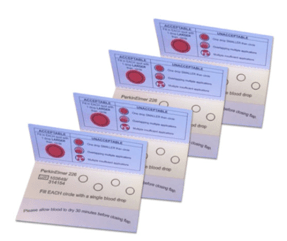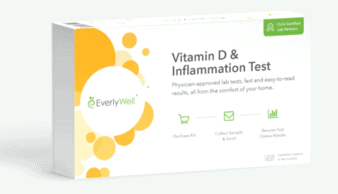Table of contents
5 Facts about an At Home Inflammation Test
- Purpose: Helps determine a potential cause of chronic inflammation by measuring inflammation-related biomarkers. Most products measure at least three biomarkers, with the most common being the CRP
- How it Works: You can order a kit online and get it delivered within 5-7 days. Follow the instructions to perform the test, send it via mail to the lab, and results are typically available within 5–24 days, which you can check online
- Cost: At home inflammation test kits usually range from $70–$150
- Results: Results are usually characterized by certain levels of the biomarkers tested and whether they fall within the normal range or not. If outside of the accepted range, most kits provide potential solutions to improve the condition. The company will usually suggest you retake the test after implementing the solutions
- Recommended products: Nebula 30X Whole Genome Sequencing is a reliable DNA Test that decodes all of your genetic blueprints with high accuracy
What is an At Home Inflammation Test?
An at home inflammation test is a DIY medical screening that helps you determine the existence of chronic inflammations by measuring certain biomarkers. It helps you identify a potentially serious inflammatory condition before it becomes major enough to cause irreversible damage. Or, it can confirm a condition without having to make an appointment with your medical provider.
Normally, inflammation is the body’s natural response to injuries, infections, and toxins. When acute inflammation occurs, white blood cells from the immune system rush to the site of injury. The acute phase often appears as redness or swelling at the site of infection or injury. For example, some insect bites are infamous for causing red, itchy bumps on the skin. Once the state of inflammation does its job, it clears up on its own in a few hours to a few days.

Inflammation becomes a problem when it remains active for months or years in the absence of injury. This condition is known as chronic inflammation. Over time, chronic inflammation can lead to medical conditions such as cardiovascular disease, diabetes, cancer, arthritis, and bowel diseases like Crohn’s disease and ulcerative colitis.
Other cases of chronic inflammation are brought upon by autoimmune disease, such as rheumatoid arthritis and psoriasis.
The troubling part of chronic inflammation is that it usually doesn’t present serious symptoms. Instead, it silently attacks tissues and organs for years and only becomes noticeable after severe damage. Some early signs of chronic inflammation include persistent joint pain, fever, headaches, and general fatigue. Taking a home test ensures you are not caught off guard.
These are some of the inflammatory markers that can help determine chronic inflammation:
C-Reactive Protein (CRP)
Given the tricky nature of the inflammation, elevated levels of CRP in your blood are the most reliable indicators of active systemic chronic inflammation. They can also identify whether inflammation is progressing or alleviating. CRP is a protein produced in the liver that is released in the bloodstream in response to inflammation. In a healthy individual, it serves as a warning signal to your tissues that an injury or infection is occurring.
The CRP usually has an extremely narrow range that lies between <3-10 mg/L in a healthy person. If a person has chronic inflammation, high CRP could rise several hundred folds.
Most at home inflammation tests include CRP as one of the biomarkers tested.

It is, however, important to note that CRP concentrations may rise due to a critical illness. This, therefore, makes procalcitonin (PCT), an indicator for bacterial infections, a more reliable option when dealing with extremely ill patients and those in ICU. Apart from this situation, the CRP is generally recommended because it can quickly tell when inflammation is serious (immediate high concentrations) and when it is successfully reduced.
Some tests look specifically for very low inflammation levels of CRP. A high sensitivity C reactive protein, or hs CRP test, can help diagnose heart disease risk, even if other symptoms are absent.
Procalcitonin (PCT)
High circulation of procalcitonin (PCT) is a good indicator of inflammation and is induced by bacteria infection. Other conditions could also lead to an increase of this marker, including severe viral infection, pancreatitis, and other autoimmune disorders. When testing for inflammation in extremely ill patients, it is a great recommendation as the CRP falls typically short here.
HbA1C (glycated hemoglobin)
The HbA1c is another marker for inflammation. A high level of HbA1c concentration indicates a high level of glucose over the time of 3 months. Higher HbAiC is also associated with inflammation.
Vitamin D
There has been a strong correlation between vitamin D deficiency as a risk factor in developing inflammation and related symptoms. Vitamin D is a fat-soluble compound that’s created when sunlight strikes your skin. Adequate levels of vitamin D are considered anti-inflammatory substances and help fight off increased risk of inflammation. Therefore, low levels of vitamin D are associated with higher instances of inflammation.

Erythrocyte sedimentation rate (ESR)
This is a blood test that is performed by placing blood in a tall, thin tube and waiting for erythrocytes (red blood cells) to settle to the bottom. Inflammation causes these cells to clump. The more inflammation that is present, the quicker the erythrocytes will fall to the bottom.
Other tests must be performed to positively diagnose inflammation but ESR can act as a confirmation tool and monitor the progress of an inflammatory disease.
How Much does an At Home Inflammation Test Cost?
Prices vary depending on the company selling it. It often depends on how comprehensive the test is and how many biomarkers it tests. Overall, these are the prices for some tests out there:
- EverlyWell: one of the most popular medical home lab kit companies, EverlyWell sells a complete inflammation kit for $99, but you can get a discount if you subscribe.
- ZoneLabsCellularInflammationTestKit: The company sells its at home inflammation kit for $75.
Getting Started with an At Home Inflammation Test
An at home inflammation test is just as reliable as laboratory tests performed in a traditional lab.
Most at home kits include:
- DIY Instruction material
- An Activation card
- A medical grade collection device card (commonly known as test cards)
- Envelope for returning both cards
- Lancets (finger pricking equipment)
- Wool
- Gauze pad
- Band-aid
- Alcohol swab
You first register your test kit online, which will send you a code that allows you to receive updates on whether your test cards were received and the subsequent test results
It is advised that the test should be done 12 hours after the last meal to ensure other external nutrients do not alter the test. Because of this, many people find it most convenient to take the test first thing in the morning before a meal.
Other medications, including nutritional supplements, should be avoided at least three days before the test. Consult your medical provider before stopping any medication.
Given the fact that it is an inflammation that is being measured, you would want to ensure that you are not pregnant at the time of the test, as temporary inflammation could be at a rise at those times.

The next thing to do will be to carry out the blood test. Most tests are performed in a similar way, but some tend to test more biomarkers which is great as it gives an encompassing result on what could be the cause of the inflammation.
Generally, you will prick your finger with a lancet to draw a blood sample, allow the sample to drop onto one or more biomarker cards, and mail the cards into the laboratory for analysis. Results are generally delivered via email or a secure online company portal.
Different companies sell products that test one or more biomarkers for inflammation. The Grassroothealth inflammation test kit offers you the option of testing at least four biomarkers which include the Crp and Vitamin D. Each of the four tests have their own blood spot test cards. The other two biomarkers are the Omega (Omega-3 Index with AA:EPA and Omega-6:Omega-3 Ratios), and HbA1.

The Everlywell tests just two biomarkers which are the popular Crp and Vitamin D markers. It is highly recommended as its results are comparable to LabCorp and Quest Diagnostics.
After sending in the sample, the expected time of getting the results ranges from 7 days to 15 days. You would usually receive an email to notify you that your result is available and can be accessed online.
At Home Inflammation Test Results
The test will come with a comprehensive detail of each biomarker and highlight each range’s associated risk level. The result compares each marker with the acceptable range and, from the value, suggests recommendations for improving inflammation or reducing inflammation risk.
CRP: For a standard CRP test, a normal reading is less than 10 mg/L. A test result showing a CRP level greater than 10 mg/L indicates serious infection, trauma or chronic disease. The downside to this test is that it doesn’t tell you what the cause of the inflammation and further tests are usually necessary. Since CRP fluctuates, additional tests two weeks apart may be recommended.
Vitamin D: To assess Vitamin D, this test measures 25-hydroxy-vitamin D in the blood. Most experts agree that a level below 20 was considered a vitamin D deficiency. However, many healthy people have values below that level so it is important that these measurements be used as a guide with other health aspects.
Quest Diagnostics defines vitamin D results as the following:
| Vitamin D levels | Blood levels (ng/mL) |
|---|---|
| Deficient | < 20 |
| Insufficient | 21–29 |
| Sufficient | 30–100 |
Companies may provide recommendations that include medicine treatment or lifestyle changes. It is important that a certified medical professional reviews the results if you are unsure and confirm treatment options.
You may also be interested in these other wellness tests you can take from home:
- Women’s health test (hormones, cholesterol, nutrients, and more)
- Men’s health test (hormones, proteins, cholesterol, and more)
- Heart health test (cholesterol and other lipids)
- Vitamin D test (hydroxyvitamin D levels)
- Cholesterol test (total cholesterol, HDL, LDL, and triglycerides)
- Thyroid test (TSH, FT4, FT3, and TPO)
- Testosterone test (total, free, SHGB binding, albumin binding)
- Metabolism test (testosterone, TSH, cortisol, and progesterone)
- Food sensitivity test (immune response to up to 600 foods)
